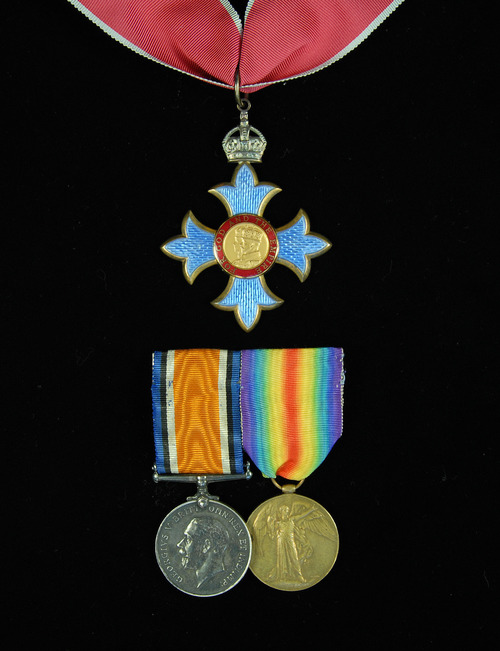
Auction: 15002 - Orders, Decorations, Campaign Medals and Militaria
Lot: 5
The C.B.E. Group of Three to Test Match Cricketer Captain R.K. Nunes, British West Indian Regiment and Royal Air Force, Later the First Test Captain of the West Indies Cricket Team
a) The Most Excellent Order of the British Empire, 2nd type, Civil Division, Commander's (C.B.E.) neck Badge, silver-gilt and enamel, with full size and miniature width neck ribands, in Garrard, London, case of issue
b) British War and Victory Medals (Capt. R.K. Nunes. R.A.F.), edge bruise to BWM; VM unofficially renamed, toned, good very fine, with the recipient's related miniature awards, and various photographic images of the recipient and the 1928 West Indies XI (3)
C.B.E. London Gazette 7.6.1951 Robert Karl Nunes, Esq.
'For public services in Jamaica.'
Captain Robert Karl Nunes, C.B.E., was born in Kingston, Jamaica, in June 1894, and was educated at Dulwich College, London, where he excelled at cricket and topped the College batting averages in 1911 and 1912- his teammates in the Dulwich 1st XI included Arthur and Harold Gilligan, who both went on to captain England. Commissioned Second Lieutenant in the British West Indies Regiment in February 1917, Nunes embarked for France in March 1917 and served with his Regiment on the Western Front for the next 15 months, being advanced temporary Captain. He returned to the UK in July 1918, and was commissioned into the Royal Air Force with the rank of Captain in October 1918. His first operational posting was with No. 236 Squadron, based at R.N.A.S. station Mullion, near The Lizard in Cornwall, where he was involved in anti-German submarine patrols, and he remained with this unit until being discharged in June 1919.
After the War Nunes remained in England for a while, playing a few matches for Surrey 2nd XI, before returning to his native Jamaica.
West Indies Test Captain
In 1920 Nunes resumed his cricket in Jamaica, playing for the Kingston club, and in 1923 was appointed captain of Jamaica and selected as vice-captain and wicket keeper for the West Indian tour of England. The tour did not feature any Test Matches (the West Indies at this stage were not a Test Nation), but was an overall success, the tourists winning 6, drawing 7 and losing 7 of their 20 First Class matches against the Counties and other representative sides, and Nunes made his First Class debut in the nine-wicket loss against Cambridge University at Fenner's, where he opened the batting and scored 59. Back in the Caribbean, he continued to captain Jamaica, and in 1926 became the first West Indian to score a century against an M.C.C. touring team. The following year he made his highest First Class score of 200 not out.
In 1928 the West Indians again toured England, and this time the tour itinerary included three Test Matches, the first Test Matches in which the West Indies played. Nunes was appointed tour captain (and wicket-keeper), and on the 23rd June led out the West Indies for their inaugural Test Match, at Lord's. In a rather one-sided match, England won by an innings and 58 runs shortly before lunch on the third day. The second Test Match at Old Trafford, and the third at The Oval, were equally one-sided, England again winning both by an innings, but Nunes acquitted himself well on the rest of the tour, hitting two centuries and scoring nearly 1,000 runs.
In 1930 England toured the West Indies, with four Test Matches included in the itinerary. Nunes did not play in the first three, but was recalled as captain for the fourth and final Test Match, played at his home ground of Sabina Park, Kingston. With the series tied at one win each, it was decided that the last match would be 'timeless' and played to the finish. Numerous records were set, as England scored 849 in the first innings. The West Indies responded with 286, Nunes opening the batting scoring 66, and after England declared their second innings closed on 272 the West Indies were set a target of 836 for victory. Nunes made 92, his highest Test score, adding over 200 runs for the second wicket with the great George Headley, but after nine days the match had to be abandoned as a draw as the boat taking England home was due to leave.
Nunes retired from playing cricket at the end of the 1932 season, having scored 245 Test runs with an average of 30.62 in his four Test Matches, and 2,695 First Class runs (including 6 Centuries) with an average of 31.33 in his 61 First Class matches. His playing days over, he remained active in cricket administration, serving as President of the West Indies Board of Control from 1945-52, and was the West Indies' representative on the Imperial Cricket Conference (I.C.C.) from 1947-51. Appointed a Commander of the Order of the British Empire in 1951, for services to West Indies cricket, a contemporary noted 'He is perhaps the greatest name in West Indies cricket. Constantine, Headley and others have done a tremendous job for us, but Nunes not only did work on the field, but behind the scenes and at the conference tables.' He died in London in July 1958, and was subsequently commemorated on a Jamaican $3 postage stamp.
Subject to 20% VAT on Buyer’s Premium. For more information please view Terms and Conditions for Buyers.
Sold for
£420




